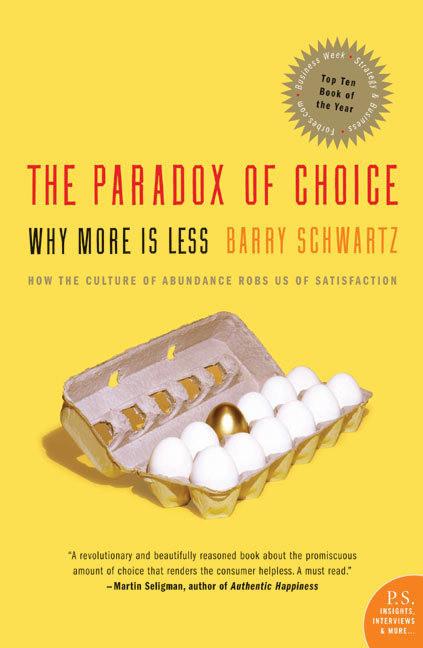Explore the World's Best Ideas
Join today and uncover 100+ curated journeys from 50+ topics. Unlock access to our mobile app with extensive features.
The Paradox of Choice:
According to Schwartz, the myriad options available to us now can create a dilemma. A sense of overload and anxiety can result from having too many options, even though having options is typically viewed as a positive component of freedom and autonomy. People may find it difficult to decide when presented with a variety of possibilities because they worry they may pick poorly and end up regretting their choice. The idea that having more options always results in greater satisfaction is called into question by this contradiction.
19
241 reads
Maximizers vs. Satisficers:
Schwartz provides two different approaches to making decisions. Maximizers are those who always look for the finest option available in any given circumstance. They carefully investigate and weigh their options, and they frequently have high levels of worry because they don't want to make the wrong decision. Satisficers, on the other hand, are happy with options that satisfy their minimum requirements. They tend to be less anxious about their choices and strive for "good enough" rather than perfection.
24
190 reads
Opportunity Costs:
Schwartz talks on how having many of options makes us very conscious of the opportunity costs. When we select one choice over others, we forfeit opportunity costs. The perceived opportunity cost of the option we choose increases when there are more options available. This increased awareness of lost options might cause regret and unhappiness after making a decision.
19
172 reads
Decision Fatigue:
Decision-making requires mental effort. According to Schwartz, decision fatigue occurs when people are presented with too many options, especially unimportant ones. Decision-making may suffer as a result of this mental fatigue, and there may be less cognitive capacity left over for other crucial tasks. It also contributes to the sensation of having too many options.
20
157 reads
Counterintuitive Consequences:
As one might anticipate, Schwartz contends that the abundance of options does not always translate into greater happiness and wellbeing. Instead, it frequently leads to a sense of being overburdened, increased stress, and a decline in life pleasure. Making the "perfect" decision may cause people to become preoccupied, which could lead to greater dissatisfaction with the decisions they make in the end.
18
156 reads
Strategies for Coping:
The book provides helpful solutions for overcoming the paradox of choice. Setting specific criteria for decision-making, limiting options in specific circumstances, and concentrating on one's own beliefs and aims rather than what others expect are a few of these tactics. These methods are intended to facilitate decision-making and lessen the detrimental effects of having too many options.
18
141 reads
The Role of Culture:
Schwartz emphasises how our attitudes towards choice are influenced by cultural circumstances. Limited options are prized in some cultures because they make decision-making easier and lower stress. These cultures place a strong emphasis on being happy with what one has. The notion that having more options results in more freedom and happiness, on the other hand, may be promoted in cultures that value unrestricted choice. Cultural norms and beliefs might affect how people perceive and handle too many options.
17
137 reads
IDEAS CURATED BY
CURATOR'S NOTE
'The Paradox of Choice' emphasizes the negative impact of overwhelming options, suggesting that understanding maximizer or satisficer decision-making styles can enhance resource management, cultural sensitivity, and sustainable consumption.
“
Different Perspectives Curated by Others from The Paradox of Choice
Curious about different takes? Check out our book page to explore multiple unique summaries written by Deepstash curators:
20 ideas
Talha Mumtaz ✔️'s Key Ideas from The Paradox of Choice
Barry Schwartz
Discover Key Ideas from Books on Similar Topics
9 ideas
Creating Great Choices
Jennifer Riel, Roger L. Martin
4 ideas
Social proof: is there always safety in numbers?
nesslabs.com
8 ideas
How to Make Smarter Decisions by Designing Your Defaults
dansilvestre.com
Read & Learn
20x Faster
without
deepstash
with
deepstash
with
deepstash
Personalized microlearning
—
100+ Learning Journeys
—
Access to 200,000+ ideas
—
Access to the mobile app
—
Unlimited idea saving
—
—
Unlimited history
—
—
Unlimited listening to ideas
—
—
Downloading & offline access
—
—
Supercharge your mind with one idea per day
Enter your email and spend 1 minute every day to learn something new.
I agree to receive email updates







